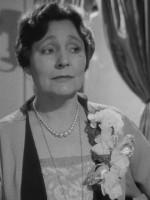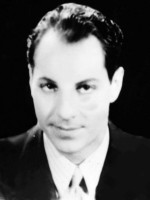Groucho Marx is a Actor and Writer American born on 30 september 1890 at New York City (USA)

Julius Henry "Groucho" Marx (October 2, 1890 – August 19, 1977) was an American comedian and film and television star. He was known as a master of quick wit and widely considered one of the best comedians of the modern era. His rapid-fire, often impromptu delivery of innuendo-laden patter earned him many admirers and imitators.
He made 13 feature films with his siblings the Marx Brothers, of whom he was the third-born. He also had a successful solo career, most notably as the host of the radio and television game show You Bet Your Life.
His distinctive appearance, carried over from his days in vaudeville, included quirks such as an exaggerated stooped posture, glasses, cigar, and a thick greasepaint mustache and eyebrows. These exaggerated features resulted in the creation of one of the world's most ubiquitous and recognizable novelty disguises, known as "Groucho glasses": a one-piece mask consisting of horn-rimmed glasses, large plastic nose, bushy eyebrows and mustache.
During the early 1950s, Groucho described his perfect woman: “Someone who looks like Marilyn Monroe and talks like George S. Kaufman.”
Often when the Marxes arrived at restaurants in Hollywood, there would be a long wait for a table. "Just tell the maître d' who we are," his wife would say. (In his pre-mustache days, Groucho was rarely recognized in public.) Groucho would say, "OK, OK. Good evening, sir. My name is Jones. This is Mrs. Jones, and here are all the little Joneses." Now his wife would be furious and insist that he tell the maître d' the truth. "Oh, all right," said Groucho. "My name is Smith. This is Mrs. Smith, and here are all the little Smiths."
Similar anecdotes are corroborated by Groucho's friends, most of whom were publicly embarrassed by Groucho on at least one occasion. Once, at a restaurant, a man approached his table. "Groucho," he said, "my wife is a big fan of yours, and is dying to be insulted by you. Would you please insult my wife?" Groucho glanced at the woman, then replied, "Sir, I'm surprised at you; with a wife like that, you ought to be able to come up with your own insults."
Groucho was denied membership in an informal symphonietta of friends (including Harpo) organized by Ben Hecht, because he could play only the mandolin. When the group began its first rehearsal at Hecht's home, Groucho rushed in and demanded silence from the "lousy amateurs". The musicians discovered him conducting a recorded performance of Tannhäuser in Hecht's living room. Groucho was allowed to join the symphonietta.
Groucho's son Arthur published a brief account of an incident that occurred when Arthur was a child. In the 1930s, the family had just returned from a vacation to Europe and was going through customs at a New York City port after their ship had docked. While filling out a customs and immigration form for re-entry into the United States, Groucho listed his birth name as "Julius Henry Marx" and his occupation as "smuggler." In the line asking the price of items brought into the country, Marx wrote "wouldn't you like to know?". The customs agents were not amused and the entire family was detained for several hours.
Later in life, Groucho would sometimes note to talk show hosts, not entirely jokingly, that he was unable to actually insult anyone, because the target of his comment would assume that it was a Groucho-esque joke, and would laugh.
Despite his lack of formal education, he wrote many books, including his autobiography, Groucho and Me (1959) and Memoirs of a Mangy Lover (1963). He was a friend of such literary figures as T. S. Eliot and Carl Sandburg. Much of his personal correspondence with those and other figures is featured in the book The Groucho Letters (1967) with an introduction and commentary on the letters written by Groucho, who donated his letters to the Library of Congress.
Groucho made serious efforts to learn to play the guitar. In the 1932 film Horse Feathers, Groucho performs the film’s love theme “Everyone Says I Love You” for costar Thelma Todd on a Gibson L-5.
Irving Berlin quipped, "The world would not be in such a snarl, had Marx been Groucho instead of Karl". In his book The Groucho Phile, Marx says "I've been a liberal Democrat all my life", and "I frankly find Democrats a better, more sympathetic crowd.... I'll continue to believe that Democrats have a greater regard for the common man than Republicans do". Marx & Lennon: The Parallel Sayings was published in 2005; the book records similar sayings between Groucho Marx and John Lennon. In a July 7, 1967 segment of "Firing Line," Marx told William F. Buckley, "The whole political left is the Garden of Eden for incompetence."
Source : Wikidata
Groucho Marx

Birth name Julius Henry Marx
Nationality USA
Birth 30 september 1890 at New York City (USA)
Death 19 august 1977 (at 86 years) at Los Angeles (USA)
Awards Commandeur des Arts et des Lettres
Nationality USA
Birth 30 september 1890 at New York City (USA)
Death 19 august 1977 (at 86 years) at Los Angeles (USA)
Awards Commandeur des Arts et des Lettres
He made 13 feature films with his siblings the Marx Brothers, of whom he was the third-born. He also had a successful solo career, most notably as the host of the radio and television game show You Bet Your Life.
His distinctive appearance, carried over from his days in vaudeville, included quirks such as an exaggerated stooped posture, glasses, cigar, and a thick greasepaint mustache and eyebrows. These exaggerated features resulted in the creation of one of the world's most ubiquitous and recognizable novelty disguises, known as "Groucho glasses": a one-piece mask consisting of horn-rimmed glasses, large plastic nose, bushy eyebrows and mustache.
Biography
Groucho's three marriages all ended in divorce. His first wife was chorus girl Ruth Johnson. He was 29 and she 19 at the time of their wedding. The couple had two children, Arthur Marx and Miriam Marx. His second wife was Kay Marvis (m. 1945–51), née Catherine Dittig, former wife of Leo Gorcey. Groucho was 54 and Kay 21 at the time of their marriage. They had a daughter, Melinda Marx. His third wife was actress Eden Hartford. She was 24 when she married the 63-year-old Groucho.During the early 1950s, Groucho described his perfect woman: “Someone who looks like Marilyn Monroe and talks like George S. Kaufman.”
Often when the Marxes arrived at restaurants in Hollywood, there would be a long wait for a table. "Just tell the maître d' who we are," his wife would say. (In his pre-mustache days, Groucho was rarely recognized in public.) Groucho would say, "OK, OK. Good evening, sir. My name is Jones. This is Mrs. Jones, and here are all the little Joneses." Now his wife would be furious and insist that he tell the maître d' the truth. "Oh, all right," said Groucho. "My name is Smith. This is Mrs. Smith, and here are all the little Smiths."
Similar anecdotes are corroborated by Groucho's friends, most of whom were publicly embarrassed by Groucho on at least one occasion. Once, at a restaurant, a man approached his table. "Groucho," he said, "my wife is a big fan of yours, and is dying to be insulted by you. Would you please insult my wife?" Groucho glanced at the woman, then replied, "Sir, I'm surprised at you; with a wife like that, you ought to be able to come up with your own insults."
Groucho was denied membership in an informal symphonietta of friends (including Harpo) organized by Ben Hecht, because he could play only the mandolin. When the group began its first rehearsal at Hecht's home, Groucho rushed in and demanded silence from the "lousy amateurs". The musicians discovered him conducting a recorded performance of Tannhäuser in Hecht's living room. Groucho was allowed to join the symphonietta.
Groucho's son Arthur published a brief account of an incident that occurred when Arthur was a child. In the 1930s, the family had just returned from a vacation to Europe and was going through customs at a New York City port after their ship had docked. While filling out a customs and immigration form for re-entry into the United States, Groucho listed his birth name as "Julius Henry Marx" and his occupation as "smuggler." In the line asking the price of items brought into the country, Marx wrote "wouldn't you like to know?". The customs agents were not amused and the entire family was detained for several hours.
Later in life, Groucho would sometimes note to talk show hosts, not entirely jokingly, that he was unable to actually insult anyone, because the target of his comment would assume that it was a Groucho-esque joke, and would laugh.
Despite his lack of formal education, he wrote many books, including his autobiography, Groucho and Me (1959) and Memoirs of a Mangy Lover (1963). He was a friend of such literary figures as T. S. Eliot and Carl Sandburg. Much of his personal correspondence with those and other figures is featured in the book The Groucho Letters (1967) with an introduction and commentary on the letters written by Groucho, who donated his letters to the Library of Congress.
Groucho made serious efforts to learn to play the guitar. In the 1932 film Horse Feathers, Groucho performs the film’s love theme “Everyone Says I Love You” for costar Thelma Todd on a Gibson L-5.
Irving Berlin quipped, "The world would not be in such a snarl, had Marx been Groucho instead of Karl". In his book The Groucho Phile, Marx says "I've been a liberal Democrat all my life", and "I frankly find Democrats a better, more sympathetic crowd.... I'll continue to believe that Democrats have a greater regard for the common man than Republicans do". Marx & Lennon: The Parallel Sayings was published in 2005; the book records similar sayings between Groucho Marx and John Lennon. In a July 7, 1967 segment of "Firing Line," Marx told William F. Buckley, "The whole political left is the Garden of Eden for incompetence."
Usually with
Filmography of Groucho Marx (32 films)
Actor

Humor Risk (1921)
Directed by Richard Smith
Origin USA
Genres Comedy
Actors Marx Brothers, Chico Marx, Groucho Marx, Harpo Marx, Zeppo Marx, Jobyna Ralston
Roles le truand
Rating79%





Information about the plot of the film is sparse. Filmed in Fort Lee, New Jersey, its title was a spoof of the then-popular Fannie Hurst drama Humoresque, one of the biggest film hits of 1920. In addition, the brothers were working separately, rather than as a team, and did not incorporate their trademark comic personalities for which they later become famous.
Scriptwriter

The King and the Chorus Girl (1937)
, 1h34Directed by Mervyn LeRoy
Origin USA
Genres Comedy, Romantic comedy, Romance
Actors Joan Blondell, Edward Everett Horton, Alan Mowbray, Mary Nash, Jane Wyman, Luis Alberni
Roles Writer
Rating62%





 Connection
Connection




